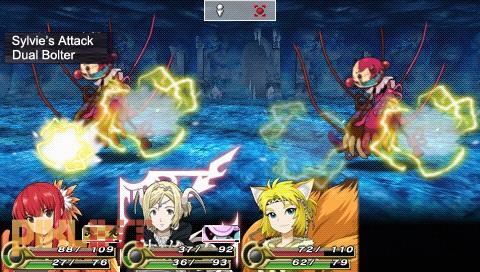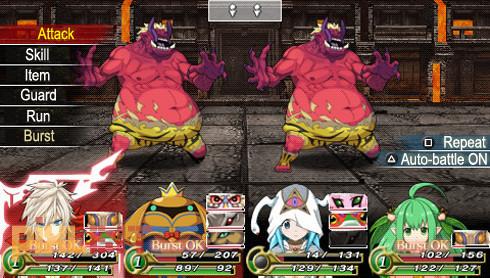Would it be fair to say that this game is a lot like Etrian Odyssey, but lacking a lot of the characteristics and fine-tuning that makes those games play as well as they do? That's kind of what I'm getting out of this. It sounds like a game I'd play if I didn't already have so many other options that do the job so much better.
Unchained Blades Review
|
|
See PixlBit's Review Policies

On 08/01/2012 at 12:00 PM by Julian Titus Yo, welcome back to MTV's The Grind! |

If you enjoy RPGs that are all about the grind such as Etrian Odyssey or Roguelikes you'll be right at home. But if you want more from your RPG than just constant leveling this is not the game for you.
The word on the street for a couple years has been that the PSP is dead. Just don’t say that to Xseed Games—the publisher has been taking full advantage of the PSP digital delivery method to release some truly unique games to the aging handheld. The last time I fired up my system was for their release of Corpse Party, and now I have Unchained Blades, another Japanese-developed game that normally wouldn’t see the light of day in this part of the world. I’d love to say that Unchained Blades is another absolute must-play game like I feel Corpse Party is, but unless you’re a very particular brand of gamer, this is an RPG best left by the wayside.
Legend has it that anyone willing to undertake the trials of the Titans will be granted a single wish by the goddess Clunea. But Fang—leader of all dragons—doesn’t care about any of that. He storms into Clunea’s chambers demanding to know who the strongest person in the world is so that he can prove that he’s the baddest dragon around. For his insolence, Clunea transforms Fang into a human and casts him down. Now, Fang is on a mission to take on the trials and get another audience with Clunea to regain his beastly winged form.
That’s a pretty light premise for an RPG that can stretch past the 50 hour mark, but Unchained Blades is very much rooted in the sensibilities of hardcore first person dungeon crawlers like Wizardry, Might and Magic, and Etrian Odyssey. The game is comprised of two main components: the town area where all of your party business (shopping, crafting, resting, etc.) is done, and the dungeons where you’ll spend 99% of your time.
These dungeons are explored from a first person perspective. Each of the “Titans” has a particular theme to its design—Titan Darius looks like it was built by an architect with a thing for piping hot magma, while Titan Tortuga is all natural caves filled with water, for example. When you step into one of these Titans the goal is to get a layout for the place and make your way as far as you can before your health and magic points are so low that you have no choice but to return to town. Treasure can be right around the corner, as well as harvesting points to obtain crafting components…assuming you have the right tool to extract them, that is.
While the polygonal environments look very sharp and can vary drastically from dungeon to dungeon, within a singular Titan the textures repeat at such a rapid rate that it can be easy to get lost, or just plain bored with the surroundings. The mini map—filled in as you explore—is set to overlay the screen by default, and I think this is the best way to play, lest you get turned around by the samey rooms connected by nearly identical hallways. Unchained Blades is a game of repetition, where you push forward a little further each time you venture forth. Thoroughly exploring will allow you to find shortcuts and places to heal your party’s hit points, but anytime your magic points are depleted you have no choice but to return to town and stay at the inn. There’s no way to teleport to town and right back to where you were, so starting at the entrance each time can feel like a setback.
Though schlepping through the starting areas of a dungeon you’ve already spent hours in can become frustrating and even boring, at least your party members are always making progress. You control a party of up to four members, and battles are purely turn-based affairs. Unchained Blades doesn’t pull any punches with its difficulty; enemies hit hard, your party will routinely miss attacks, and experience points and gold come in slowly. This can feel almost punishing at times, but the slow pace of progression makes each of your party building decisions supremely important. Do you blow all of your money on a single piece of armor to make a character last longer in a dungeon, or do you stock up on healing potions and grind for better gear later? This is an RPG where each additional point in any given stat can have an immediate and noticeable effect on your performance, and I appreciate an RPG that makes me really have to think about how I spec my characters.
To get those stat increases you’re going to have to grind. And grind. And grind some more. Besides the simple act of leveling up your party members, Unchained Blades has a monster catching element to it. Sometimes when a monster drops below 50% health you’ll have an opportunity to “unchain” it. Succeeding in a simple button prompt mini game will convince the monster to join you. Monsters can be assigned to a party member, which provides a few different benefits. By matching the right selection of monster elements to a particular character, new abilities and spells become available, but the most useful aspect of this mechanic is that monsters will often step in front of their masters, either taking damage for them or negating the attack completely. Monster followers can fall in battle, but a quick trip to a healing crystal or camp will set them right as rain.
Unchaining monsters is the most unique part of Unchained Blades, but it also adds to the grind of the game immensely. It can be a chore just getting monsters to go into the state where they can be captured, and once done you’ll need to level them up just as you would your party members. It’s important to raise your Charisma Levels higher in order to equip stronger monsters, and this is done by talking to them or performing well in battle. Some doors won’t open unless you have a high enough Charisma Level, adding even more to the grind. Unchained Blades becomes a game all about numbers, and it feels like a game that would be half as long if the leveling mechanic was smoother, or if areas weren’t locked behind restrictions that force you to spend more hours fighting random battles.
Overall, it's an oddly paced game with dungeons that can feel almost punitive in their difficulty initially, but after a few hours of grinding become a piece of cake. The only time the game seems “just right” in its challenge is the boss battles, which are lengthy fights where all of your strategy and item management are necessary to win the day.
It grinds to a halt when you’re put up against Judgement Battles. These are fights between all of your monsters and a group of enemy foes. Set up like a bad rhythm game where you’re tasked with pressing the D-pad at the correct time, Judgement Battles remove all sense of strategy and control from the game. It purely comes down to a matter of who has the better monsters. Having a team of 30 low-tier monsters will do no good against a team of 7 mid to high-tier critters. The only thing you can do is go hunt down stronger monsters to join you, which again can be a major pain in the rear.
There’s something satisfying about getting your nose bloodied by a tough dungeon only to come back and annihilate everything in your path, and if Unchained Blades had a better presentation that might be enough for me. But the battle screens are lifeless affairs, with no animation or interesting effects. In that respect it's reminiscient of the classic Dragon Quest games, but I need a little more zing in my RPGs. The game really just becomes all about the grind, and while I know there are plenty of masochistic gamers out there that would love this game, I have far more interesting games to occupy my time than this.












Comments